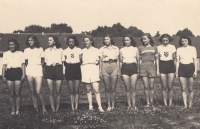I think I’m a normal person who lives honestly, doesn’t hurt anyone, likes nature, but most of all I had and I have an amazing family
Milada Frantalová, née Hronová, was born in Sezemice on January 23, 1927 in a family with a small farm. Due to the restrictions of the secondary grammar school in Pardubice during the German occupation, she studied and finished family school, she was totally deployed on the track in Pardubice, where she became a direct witness to the allied bombing. Her parents helped to a friendly Jewish family called the Poláčeks. They hid a part of their property before they were board to the transport, the witness experienced a Gestapo raid on a member of the military resistance, a trial with the collaborator Opletal and his murder while he was trying to escape from the arrest. She witnessed the days of May 1945 and recalls several experiences with Soviet soldiers. She participated in XI. All-Sokol meeting in Prague in 1948, marked by an incident with an agile supporter of the Communist Party. After the war, she got married and raised two children. She retired in the 1990s.








